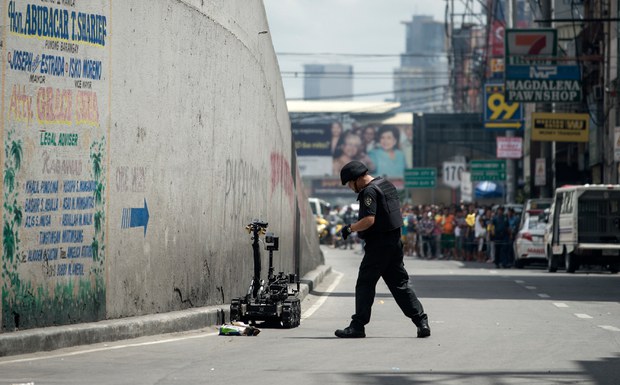Philippines: Twin Bombings That Killed 2 Not Terror Attacks
2017.05.08
Manila
 A Manila police officer uses a bomb-disposal robot to inspect a suspicious package left near a mosque in the Quiapo district, May 7, 2017.
A Manila police officer uses a bomb-disposal robot to inspect a suspicious package left near a mosque in the Quiapo district, May 7, 2017.
Police officials in the Philippines on Monday dismissed terrorism as the motive in twin weekend bombings that killed two people near Manila’s Muslim area and said they arrested one of the four identified suspects.
Police Senior Superintendent Joel Coronel, chief of the Manila Police District, said police identified the suspect in custody as Abel Macaraya, who allegedly was responsible for the Saturday evening bomb attacks near a mosque in Quiapo district.
He has been charged with multiple frustrated murder and illegal possession of explosives charges, Coronel said.
Coronel ruled out terrorism as an angle, adding the motive for the attack was personal and connected to a dispute involving the suspect’s brother-in-law who was beaten by two men.
The case apparently has not been acted upon and remained at the desk of a local Shiite Muslim cleric, Nasser Abinal, who was the target of the attack but was unhurt because he was not at his office at the time of blast.
“Based on our investigation, the family was angered by the inaction and they came up with revenge,” Coronel told a news conference in Manila.
Three other suspects are being sought, Coronel said.
Crude bomb
Coronel emphasized that the explosive used in Saturday’s attack was crudely made compared to ones used by known terrorist groups. He said the improvised explosive was not sophisticated and easily assembled.
“Based on the evidence recovered from the crime scene, the bomb was concealed in a black eco-bag (a reusable shopping bag),” he said, describing the device as explosives packed inside a steel pipe that was electronically triggered.
Coronel said five men injured in the blasts were being treated at a hospital and two will require amputations because of the severity of their injuries. Also recuperating were two police officers who were responding to the first bomb explosion when the second blast occurred about an hour later.
Local terrorism analyst Rommel Banlaoi, who has been tracking Islamic State- (IS)-linked militant groups as head of the Center for Intelligence and National Security Studies, said it would be foolhardy for the Philippines to just simply dismiss the attack.
“The IEDs (improvised explosive device) used were signature bombs used by violent extremist groups,” he told BenarNews, naming the Abu Sayyaf Group, Bangsamoro Islamic Freedom Fighters and the Maute group.
These groups operate in the country’s far south, but are known to have sympathizers in the capital Manila.
Last month, officials said the army killed 37 militants, including three Indonesians and a Malaysian, while capturing a southern jungle camp of the Maute group, an extremist group President Rodrigo Duterte has said has links with the IS.
The same group has also been blamed for a September 2016 bombing of a night market that left 15 dead in Duterte’s southern home town of Davao city.
Last month, Abu Sayyaf militants attempted abductions in the central island of Bohol, a popular tourist destination. Nine of the gunmen were killed, including a sub-commander wanted for the deaths of several kidnap victims, including a German and two Canadians who were seized separately and beheaded this year and last year, respectively.
Saturday’s attack also came less than two weeks after a blast in Quiapo district injured 14 as Manila was hosting Southeast Asian leaders for a regional summit. Police dismissed that as related to a gang war.
“The use of that type of IEDs for criminal or personal purpose is a game-changer in criminal violence involving Muslim personalities,” Banlaoi said. “Those IEDS are typically used for politically motivated violence.”
He warned Philippine law enforcement agencies not to readily dismiss the terrorism angle.
Military spokesman Brig. Gen. Restituto Padilla on Monday said the incident was “purely a law enforcement” matter.
“There was a lead that was found by the police that was credible enough and they are pursuing that. So the police are on top of the situation and the military is not involved in this,” he told reporters.
He said IS-linked groups have claimed the attack in Internet postings, but “there is no group that claims or has been saying it correctly,” Padilla said.
“Whatever group that you have been hearing from that is pure propaganda and let us not dignify whatever those groups are saying,” he said.
“As I told you this is not related to terrorism just like what the police mentioned,” Padilla said. “There is a credible lead which indicates that the bomb was meant for a personality and that personality is already interviewed. That lead is now being used by the police to investigate the case.”







